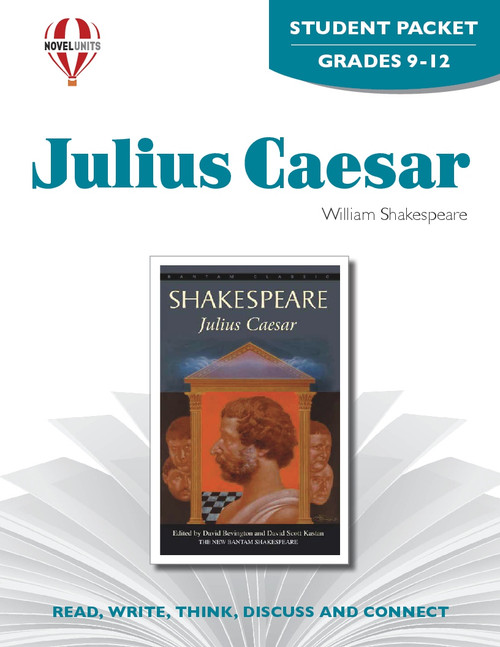Product Overview
Julius Caesar: Beware The Ides Of March
Shakespeare's play is a timeless exploration of power, loyalty, and human nature.
Ordering Books for Julius Caesar by William Shakespeare
No order minimum; you can order just one copy if that's all you need! :-) Order your class set of books for Julius Caesar now, and take advantage of our bulk order discounts!
Notes About The Literary Touchstone Classics Edition of Julius Caesar
We think the Literary Touchstone Classic edition of Julius Caesar is the best for classroom use. These affordable editions of beloved works are designed by former educators with the needs of both teachers and students in mind.
To help students fully understand the classic work they're studying, every Literary Touchstone Classic includes pre-reading notes that cite important aspects of the text that students should examine and question while reading. Each book also contains an extensive vocabulary list and a glossary that explains unfamiliar allusions and challenging passages.
If you're looking for books that will last for years, Literary Touchstone Classics fit the bill. Sturdy bindings and high-quality paper ensure they'll hold up to repeated use, and they're made in the U.S.A.
Other Editions
If you need to add onto a class set of a different edition or simply prefer another edition, contact us with the ISBN, and we'll check the availability for you.
If you are reading Julius Caesar with students who need a simplified version, contact us, and we'll help you find one that is appropriate for your situation.
About the Play Julius Caesar |
Julius Caesar opens with the triumphant return of Caesar to Rome after defeating Pompey. His growing power concerns several senators, including Brutus and Cassius, who fear Caesar's ambition will lead to tyranny. The conspirators plot to assassinate Caesar, believing they are saving Rome from dictatorship. Despite numerous warnings, including a soothsayer's ominous "Beware the Ides of March," Caesar goes to the Senate on March 15th. There, the conspirators stab him to death. Caesar's famous last words, "Et tu, Brute?" highlight the deep betrayal by his friend Brutus. Chaos erupts in Rome following Caesar's death. Brutus and Cassius attempt to justify their actions to the public, but Mark Antony's stirring funeral oration turns the crowd against the conspirators. Antony, Octavius, and Lepidus form a triumvirate to defeat Brutus and Cassius, leading to a dramatic battle at Philippi. In the end, both Brutus and Cassius meet tragic deaths, marking the fall of the conspirators.
|
Themes in the play Julius Caesar |
Power and Ambition: One of the central themes in Julius Caesar is the corrupting influence of power and ambition. Caesar's ascent and the conspirators' fear of his potential tyranny underscore the dangers of unchecked ambition. This theme provides a rich ground for classroom discussions on leadership and ethics. Betrayal and Loyalty: The play explores the thin line between betrayal and loyalty. Brutus's internal conflict over his loyalty to Caesar versus his duty to Rome is a compelling study of personal integrity and political responsibility. Fate versus Free Will: Julius Caesar also grapples with the tension between fate and free will. The soothsayer's warnings and omens suggest a predetermined outcome, yet the characters' actions drive the plot. Discussing this theme can help students understand how choices shape history and personal destinies.
|
Activity Ideas for the play Julius Caesar |
Interactive Plot Mapping: Create an interactive plot map with your students. Use a large poster or digital tools like MindMeister to outline key events. Encourage students to add illustrations or quotes, helping them visualize the play's structure and retain important details. Character Diaries: Assign students to write diary entries from the perspective of different characters. This activity fosters empathy and deeper understanding of motivations and emotions. Discuss how each character's perspective influences their actions and the play's outcome. Debates on Ethical Dilemmas: Host classroom debates on ethical dilemmas presented in the play. For example, was Brutus justified in betraying Caesar for the greater good of Rome? These debates develop critical thinking and public speaking skills, while engaging students with the play's moral complexities.
|

Customer Service
- We guarantee you'll have the best customer service experience ever with Teacher's Pet Publications.
- We are here to help make things as easy as possible for you!
- Your information is secure. We don't keep your card number on file anywhere, and we don't sell, rent, or give away your personal information.
- We treat you as we would like to be treated as a customer!
- Need help? Have questions? We're always happy to assist you! Contact Us











